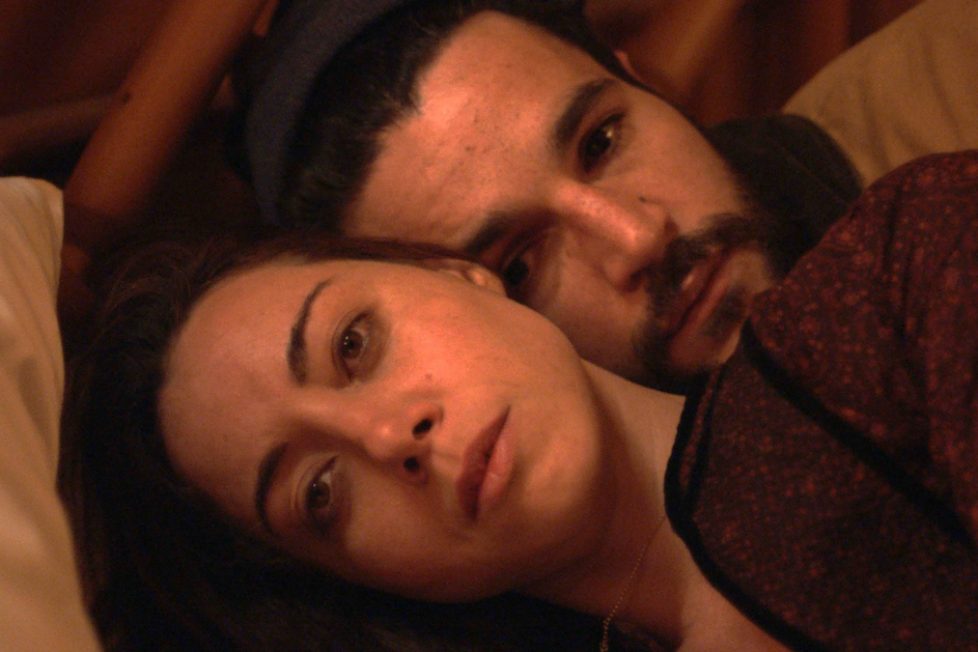BLACK BEAR (2020)
A filmmaker at a creative impasse seeks solace from her tumultuous past at a rural retreat, only to find that the woods summon her inner demons in intense and surprising ways.

A filmmaker at a creative impasse seeks solace from her tumultuous past at a rural retreat, only to find that the woods summon her inner demons in intense and surprising ways.


Allison (Aubrey Plaza) is a failed actor-turned-director taking time out at a countryside retreat, where she hopes to break her creative block while staying with a couple called Gabe (Possessor’s Christopher Abbot) and Blair (Sarah Gadon). It feels like a setup to a typical horror film, but delivers more social scares than the gore one might expect, thanks to its ominous music and misty woodland setting.
Gabe and Blair seemingly have nothing in common and even disagree on their own life story. She’s an ex-dancer and he’s a semi-professional musician, but they can’t even agree on that either. Blair’s also in her second trimester of pregnancy, paranoid Gabe doesn’t want the baby and feeling trapped by his overprotectiveness. Things play out like Who’s Afraid of Virginia Wolf, only with a millennial’s social conscious.
Allison is vicious; smirking throughout dinner and purposely agreeing to all of Gabe’s points, even if they contradict her own previously stated opinions. She drops biographical titbits into the conversation, only for them to later be revealed as fake. As the night drags on Allison goes from passive-aggressive to simply aggressive, fanning any flames of discontentment she can between them. Is she purposely provoking this couple to argue, or is this part of her creative process? It makes for a hard but engaging watch.
Any knowledge past this would spoil writer-director Lawrence Michael Levine’s cleverly crafted movie. Fuelled by a career-defining performance from Aubrey Plaza (Child’s Play), who proves she’s a more capable actress than the sarcastic eye-rollers she’s come to be known for, Black Bear is a unique film that’ll leave you questioning it for days afterwards.
Black Bear works on several levels. It’s so open for interpretation that it works however you want it to. Separated into different parts, or layers, or subplots, it’s partly a sharp black relationship comedy, part exploration of the creative process, and part metafiction. Someone who understands the creative process will have a different view of the film compared to someone in a toxic relationship, or the partner of an artist.
The screenplay is full of fizzing dialogue, sold by committed performances from the three leads. Levine’s creates a claustrophobic air which is almost theatrical. Every scene is propelled by razor-sharp lines, ensuring its many static-looking scenes are never boring to watch unfold. Levine clearly understands the ebb and flow of real-life quarrels, and even once the plot stops making sense the dialogue is always crystal clear.
For a film with minimal plot and no real action, you won’t be able to take your eyes off the screen. Nothing’s as it appears and everything is presented with an uncanny dreaminess. To reveal the true intentions of Black Bear would be cruel, as half the appeal is peeling away the layers of interpretations. You need to watch it carefully, taking note of people’s mannerisms and the way dynamics change, as it will be important later.
Black Bear starts off as a classic black comedy-drama about toxic masculinity and gaslighting, but soon turns the tables. We’re all playing games with each other and constantly breaking our own rules to appease others, but for what reason? Black Bear addresses these issues without needing big monologues and quirky voiceovers.
What starts as a black comedy evolves into a dreamlike interrogation of creativity, emotions, and artistic expression. For the many questions the film brings up, its main goal is to deliver a trippy and emotional experience. Black Bear feels like it simultaneously deconstructs the worst of human nature and the best of human creativity. The connection between these two concepts is up to the audience.
If you’re not someone who enjoys peeling back the layers of a story and who doesn’t want to mull things over, this film may not be for you. Black Bear doesn’t offer easy answers, as it wants to suck audiences in with its mood and performances above all else. But even if you don’t enjoy its vague meta stylings, you’re certain to have some opinion about it.
So go into Black Bear without any knowledge or pre-conceived ideas, then sit back and watch an alarming film. It’ll keep you on the edge of your seat, wondering exactly where things will go next, even if you have no idea where you currently are!
Black Bear is released digitally on 23 April 2021 in the UK.
USA | 2020 | 104 MINUTES | 1.66:1 | COLOUR | ENGLISH
writer & director: Lawrence Michael Levine.
starring: Aubrey Plaza, Christopher Abbott, Sarah Gadon, Paola Lázaro & Grantham Coleman.
